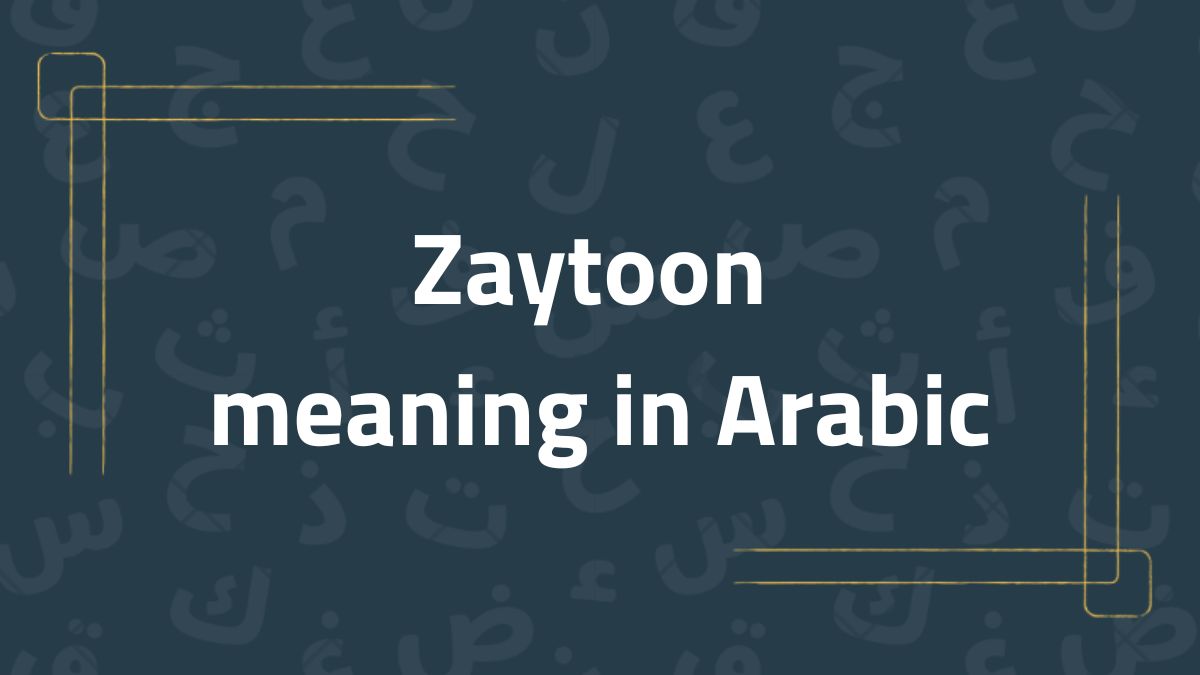The Word Zaytoon Meaning in Arabic With Examples

The Arabic word “zaytoon” (زيتون) is commonly used in both daily conversation and religious texts. It holds cultural and religious significance, making it an important term for Arabic learners.
This article explains the meaning, usage, and importance of “zaytoon” in Arabic, including its role in the Quran.
The Meaning of “Zaytoon” in Arabic
“Zaytoon” translates to “olive” in English. It refers to both the olive fruit and the olive tree. The pronunciation is “zay-toon,” with emphasis on the first syllable. Olives are a key part of Middle Eastern cuisine and agriculture, making this word widely recognized.
Linguistic Root and Grammatical Usage
The word “zaytoon” comes from the root letters “ز-ي-ت” (z-y-t), which relate to oil or fat. This root appears in other Arabic words like “zayt” (زيت), meaning “oil,” and “zaytun” (زيتون), meaning “olives” or “olive tree.”
In Arabic grammar, “zaytoon” is a singular noun. Its plural form is “zayateen” (زيتين). The word does not change much in sentences, but it can take different forms based on grammatical rules.
Examples of “Zaytoon” in Arabic Sentences
-
أحب أكل الزيتون مع الخبز.
Translation: I love eating olives with bread. -
شجرة الزيتون تعيش لسنوات طويلة.
Translation: The olive tree lives for many years. -
زيت الزيتون مفيد للصحة.
Translation: Olive oil is good for health.
Cultural or Quranic Significance of “Zaytoon”
The word “zaytoon” appears in the Quran multiple times, highlighting its religious importance. One notable verse is in Surah At-Tin (95:1), where Allah swears by the fig and the olive:
وَالتِّينِ وَالزَّيْتُونِ
Translation: “By the fig and the olive.”
Olives are also mentioned as a blessed tree in Surah An-Nur (24:35), where Allah describes the light of faith as coming from an olive tree.
In Arab culture, olives symbolize peace, prosperity, and health. Olive oil is widely used in cooking and traditional medicine.
Common Misunderstandings or Mistakes
Some learners confuse “zaytoon” with “zayt” (oil). While they share the same root, “zaytoon” refers specifically to olives or the olive tree. Another mistake is mispronouncing the word as “zaytoun” instead of “zaytoon.”
Why You Should Learn “Zaytoon”
Understanding “zaytoon” helps in daily conversations, especially in Middle Eastern countries where olives are a staple food. It also aids in Quranic studies, as the word appears in significant verses. Learning this word enhances vocabulary for both beginners and advanced Arabic students.
Conclusion
The Arabic word “zaytoon” means “olive” and carries cultural and religious importance. It appears in the Quran and is widely used in Arab cuisine. Knowing this word improves language skills and helps in understanding Islamic texts. Whether for daily use or religious study, “zaytoon” is a valuable term to learn.
Learn Arabic, Quran, And Tajweed With Free Trial!
Make your home a place of faith, understanding, and connection with the Quran. Whether you're starting from scratch or deepening your knowledge, Shaykhi Academy is here to guide you — step by step. ✅ Tailored for all ages ✅ Clear, structured learning ✅ Flexible online sessions ✅ Book your free trial session now!
Learn More
